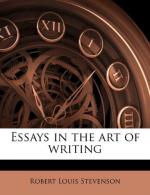parrot once belonged to Robinson Crusoe. No doubt
the skeleton is conveyed from Poe. I think little
of these, they are trifles and details; and no man
can hope to have a monopoly of skeletons or make a
corner in talking birds. The stockade, I am told,
is from Masterman Ready. It may be, I care not
a jot. These useful writers had fulfilled the
poet’s saying: departing, they had left
behind them Footprints on the sands of time, Footprints
which perhaps another—and I was the other!
It is my debt to Washington Irving that exercises
my conscience, and justly so, for I believe plagiarism
was rarely carried farther. I chanced to pick
up the Tales of a Traveller some years ago with a
view to an anthology of prose narrative, and the book
flew up and struck me: Billy Bones, his chest,
the company in the parlour, the whole inner spirit,
and a good deal of the material detail of my first
chapters—all were there, all were the property
of Washington Irving. But I had no guess of
it then as I sat writing by the fireside, in what seemed
the spring-tides of a somewhat pedestrian inspiration;
nor yet day by day, after lunch, as I read aloud my
morning’s work to the family. It seemed
to me original as sin; it seemed to belong to me like
my right eye. I had counted on one boy, I found
I had two in my audience. My father caught fire
at once with all the romance and childishness of his
original nature. His own stories, that every
night of his life he put himself to sleep with, dealt
perpetually with ships, roadside inns, robbers, old
sailors, and commercial travellers before the era
of steam. He never finished one of these romances;
the lucky man did not require to! But in Treasure
Island he recognised something kindred to his own
imagination; it was his kind of picturesque; and
he not only heard with delight the daily chapter,
but set himself acting to collaborate. When
the time came for Billy Bones’s chest to be
ransacked, he must have passed the better part of a
day preparing, on the back of a legal envelope, an
inventory of its contents, which I exactly followed;
and the name of ’Flint’s old ship’—the
Walrus—was given at his particular request.
And now who should come dropping in, ex machina,
but Dr. Japp, like the disguised prince who is to
bring down the curtain upon peace and happiness in
the last act; for he carried in his pocket, not a horn
or a talisman, but a publisher—had, in
fact, been charged by my old friend, Mr. Henderson,
to unearth new writers for Young Folks. Even
the ruthlessness of a united family recoiled before
the extreme measure of inflicting on our guest the
mutilated members of The Sea Cook; at the same time,
we would by no means stop our readings; and accordingly
the tale was begun again at the beginning, and solemnly
re-delivered for the benefit of Dr. Japp. From
that moment on, I have thought highly of his critical
faculty; for when he left us, he carried away the
manuscript in his portmanteau.




